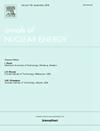蒙特卡罗辐射传输计算的局部角适应性 CADIS 混合方差缩小法
IF 1.9
3区 工程技术
Q1 NUCLEAR SCIENCE & TECHNOLOGY
引用次数: 0
摘要
本文章由计算机程序翻译,如有差异,请以英文原文为准。
Local angular adaptivity CADIS hybrid variance reduction method for monte carlo radiation transport calculations
The Consistent Adjoint Driven Importance Sampling (CADIS) method is a highly effective Monte Carlo (MC) hybrid variance reduction technique; however, its acceleration effects are significantly limited in strongly angular dependent shielding problems involving complex channels. Based on the theory of angular adaptivity, a local angular adaptivity CADIS (LAA-CADIS) hybrid acceleration method is proposed. This method enhances the accuracy of the quadrature set by dynamically adjusting the discrete angular distribution in important regions, thereby better capturing the anisotropic characteristics of angular flux density. The IRI-TUB straight channel benchmark model is selected to validate the acceleration effects of LAA-CADIS. Numerical results indicate that, under the same error conditions, the computational efficiency of LAA-CADIS improves by 34% compared to CADIS. LAA-CADIS accurately describes the neutron importance distribution in strongly angular-dependent shielding models, significantly enhancing Monte Carlo calculation efficiency.
求助全文
通过发布文献求助,成功后即可免费获取论文全文。
去求助
来源期刊

Annals of Nuclear Energy
工程技术-核科学技术
CiteScore
4.30
自引率
21.10%
发文量
632
审稿时长
7.3 months
期刊介绍:
Annals of Nuclear Energy provides an international medium for the communication of original research, ideas and developments in all areas of the field of nuclear energy science and technology. Its scope embraces nuclear fuel reserves, fuel cycles and cost, materials, processing, system and component technology (fission only), design and optimization, direct conversion of nuclear energy sources, environmental control, reactor physics, heat transfer and fluid dynamics, structural analysis, fuel management, future developments, nuclear fuel and safety, nuclear aerosol, neutron physics, computer technology (both software and hardware), risk assessment, radioactive waste disposal and reactor thermal hydraulics. Papers submitted to Annals need to demonstrate a clear link to nuclear power generation/nuclear engineering. Papers which deal with pure nuclear physics, pure health physics, imaging, or attenuation and shielding properties of concretes and various geological materials are not within the scope of the journal. Also, papers that deal with policy or economics are not within the scope of the journal.
 求助内容:
求助内容: 应助结果提醒方式:
应助结果提醒方式:


